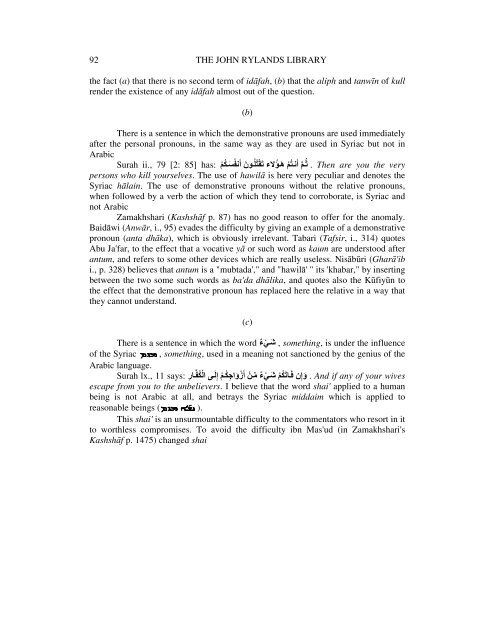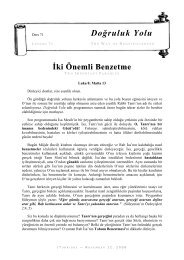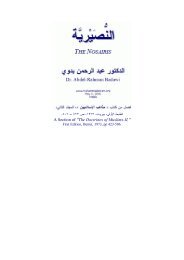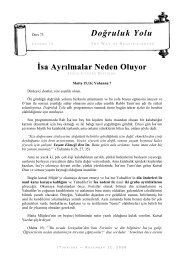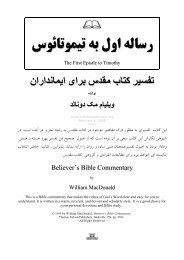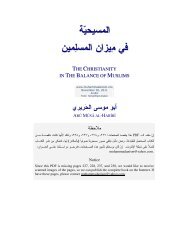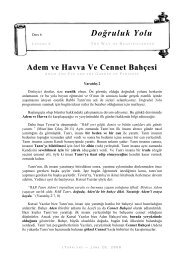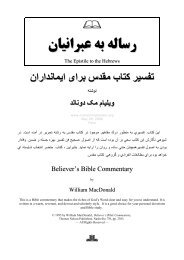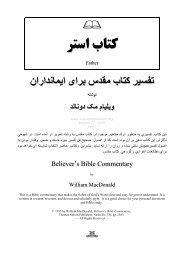Syriac Influence on the Style of the Kur'an - Muhammadanism
Syriac Influence on the Style of the Kur'an - Muhammadanism
Syriac Influence on the Style of the Kur'an - Muhammadanism
Create successful ePaper yourself
Turn your PDF publications into a flip-book with our unique Google optimized e-Paper software.
92 THE JOHN RYLANDS LIBRARY<strong>the</strong> fact (a) that <strong>the</strong>re is no sec<strong>on</strong>d term <strong>of</strong> idāfah, (b) that <strong>the</strong> aliph and tanwīn <strong>of</strong> kullrender <strong>the</strong> existence <strong>of</strong> any idāfah almost out <strong>of</strong> <strong>the</strong> questi<strong>on</strong>.(b)There is a sentence in which <strong>the</strong> dem<strong>on</strong>strative pr<strong>on</strong>ouns are used immediatelyafter <strong>the</strong> pers<strong>on</strong>al pr<strong>on</strong>ouns, in <strong>the</strong> same way as <strong>the</strong>y are used in <str<strong>on</strong>g>Syriac</str<strong>on</strong>g> but not inArabicSurah ii., 79 [2: 85] has: أَنفُسَكُمْ تَقْتُلُونَ ھَؤُالء أَنتُمْ ثُم َّ . Then are you <strong>the</strong> verypers<strong>on</strong>s who kill yourselves. The use <strong>of</strong> hawilā is here very peculiar and denotes <strong>the</strong><str<strong>on</strong>g>Syriac</str<strong>on</strong>g> hālain. The use <strong>of</strong> dem<strong>on</strong>strative pr<strong>on</strong>ouns without <strong>the</strong> relative pr<strong>on</strong>ouns,when followed by a verb <strong>the</strong> acti<strong>on</strong> <strong>of</strong> which <strong>the</strong>y tend to corroborate, is <str<strong>on</strong>g>Syriac</str<strong>on</strong>g> andnot ArabicZamakhshari (Kashshāf p. 87) has no good reas<strong>on</strong> to <strong>of</strong>fer for <strong>the</strong> anomaly.Baidāwi (Anwār, i., 95) evades <strong>the</strong> difficulty by giving an example <strong>of</strong> a dem<strong>on</strong>strativepr<strong>on</strong>oun (anta dhāka), which is obviously irrelevant. Tabari (Tafsir, i., 314) quotesAbu Ja'far, to <strong>the</strong> effect that a vocative yā or such word as kaum are understood afterantum, and refers to some o<strong>the</strong>r devices which are really useless. Nisābūri (Gharā'ibi., p. 328) believes that antum is a "mubtada'," and "hawilā' " its 'khabar," by insertingbetween <strong>the</strong> two some such words as ba'da dhālika, and quotes also <strong>the</strong> Kūfiyūn to<strong>the</strong> effect that <strong>the</strong> dem<strong>on</strong>strative pr<strong>on</strong>oun has replaced here <strong>the</strong> relative in a way that<strong>the</strong>y cannot understand.(c)There is a sentence in which <strong>the</strong> word ءٌ شَيْ , something, is under <strong>the</strong> influenceܡܕܡ <strong>of</strong> <strong>the</strong> <str<strong>on</strong>g>Syriac</str<strong>on</strong>g>, something, used in a meaning not sancti<strong>on</strong>ed by <strong>the</strong> genius <strong>of</strong> <strong>the</strong>Arabic language.Surah lx., 11 says: الْكُف َّارِ إِلَى أَزْ وَاجِكُمْ ءٌ م ِّنْ شَيْ وَإِن فَاتَكُمْ . And if any <strong>of</strong> your wivesescape from you to <strong>the</strong> unbelievers. I believe that <strong>the</strong> word shai' applied to a humanbeing is not Arabic at all, and betrays <strong>the</strong> <str<strong>on</strong>g>Syriac</str<strong>on</strong>g> middaim which is applied to). ܢܫܵ ܐ ܡܕܡ ( beings reas<strong>on</strong>ableThis shai' is an unsurmountable difficulty to <strong>the</strong> commentators who resort in itto worthless compromises. To avoid <strong>the</strong> difficulty ibn Mas'ud (in Zamakhshari'sKashshāf p. 1475) changed shaiܡܕܡ ܐ ܢܫܵܡܕܡ


